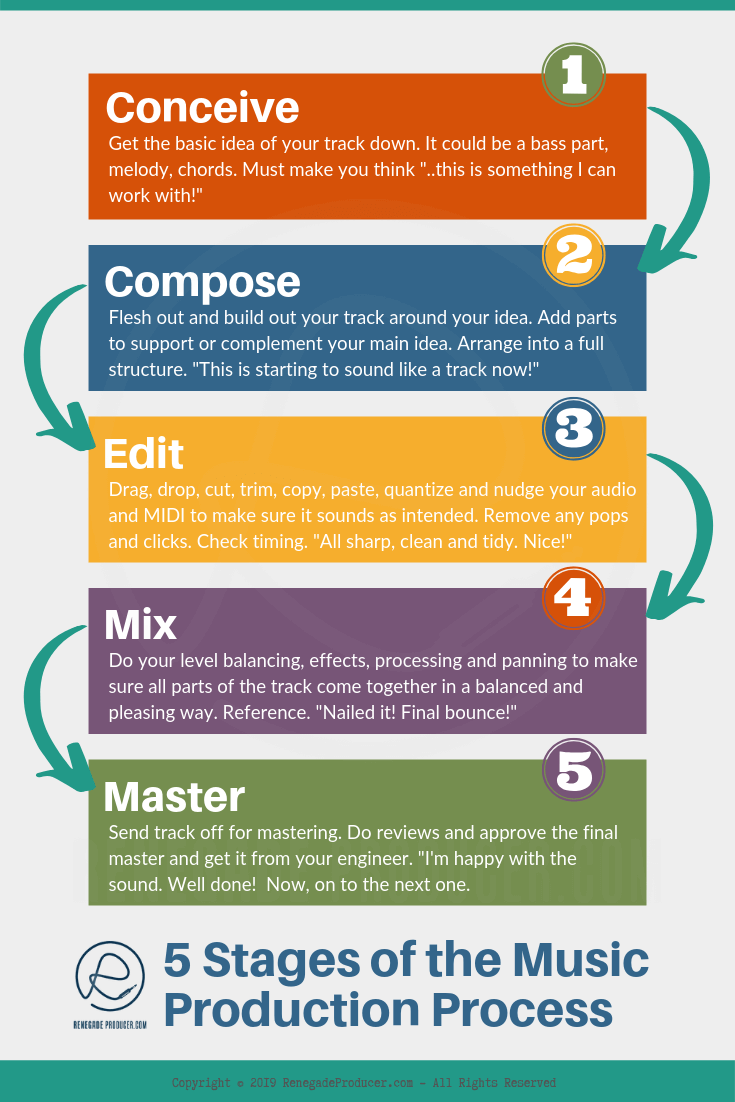25-step music production process checklist and video workshop >>>
Discover the 5 Stages of the Electronic Music Production Process + Download the 25-Step Checklist and Video Walk-Through of the Process
Every music producer you'll meet will have their own particular music production process. You'll however find certain similar processes or stages all producers must go through to create viable tracks.
|
You'll develop your own music production process as you practice your craft.
You'll discover the core stages of the basic production process below so
you'll have a big picture idea of what you'll be doing when you make
your own music. Making music has a creative and technical aspect and each requires a different mind-set from you. Let's take a look at the music production process... |
 |
You can divide the process of making your music up in to five basic parts of which you will only do the first four yourself unless you plan on mastering your own music. Let's take a quick look at each aspect of the music production process and then also the basic electronic music production process.
1. Conceive
You will first come up with a basic idea or theme. You then try as be
as clear as possible in your own head as to what you want to create with
your song. You want to imagine what it will sound like once you have
completed it and which instruments you'll use to create the sound you
want.
This is when you create and choose your sounds, decide on
your theme and create the basic sketch of the production. This can
include your main melody, chord progressions, loops and basic beats.
2. Compose
This is the stage where you "get it down". Dance music producers will build the track up from samples, loops and MIDI. Music producers who work with bands and musicians will record the different parts of the track at this time.
In this part of the production process you create your full track arrangement and finish the musical aspects of the track.
3. Edit
You will in this stage drag, drop, cut, trim, copy, paste, quantize and
nudge the various programmed or recorded parts to fit together well and
produce the completed raw song.
This part of the process where
you ensure you have no clicks and pops, that all your transitions work
well and any unwanted audio or MIDI is removed. You want to also make
sure your timing is tight on all parts.
4. Mix
Mixing or mixing down is the final stage in which you use levels, EQ, panning and effects to create the stereo image and final sound you want.
You have a choice to do this yourself or send your session to a professional mixing engineer.
5. Master
A good mastering engineer will take your mix
and finalize it into a master ready for public use. They will use
various techniques and tools to make sure the track is loud enough, has a
good stereo image and sounds professional.
Now, it's possible to
master at home and this could work fine for mixes you want to play out
in a hurry.
Professional mastering is however the best choice for
commercial releases meant for distribution.
Mastering studios will
also have professional equipment for mastering which you won't find in normal
project or bedroom studios. This is one place where it's best to leave it to those in the
know!

So, there you have the basic music production process.
Remember, nothing is set in stone here! Your actual process will probably look like some chaotic mutant-child of the above process. Some producers, for example will mix as they go along and not have much of a dedicated separate mix-down session because they feel this is important to keep the vibe going. Hey, if it works, keep it!
The point of a structured production process or workflow is to help you finish tracks so as long as you accomplish this you're on the right track.
This is the music production process used by many electronic music producers:
- Create a 8, 16 or 32 bar loop. This loop should be the climax of your
track, usually the last chorus. It needs to be full and banging.
- Take the loop you've created and copy it over once.
- Remove elements from the copy of the loop. You could for example remove some of your synth parts like the melody.
- Then, add new elements to the copied loop to make it different from the first loop.
- Now, repeat steps 2 to 4 to create a third version of the loop that's different from the first two.
- Use the 3 loops you have to create your full track arrangement. You
can use other popular tracks as references for your arrangement.
- Do your final edits. Listen to each track and remove unwanted artifacts
such as clicks and pops. Remove anything that annoys you and add
elements which seem missing.
- Mix your track: Balance your levels. Check your panning. Check your mono compatibility. Apply your final automation and FX.
- Reference your track on as many different speakers and systems as you
can and take notes. If the track is meant for Clubs then it pays to
reference it on a big rig before your final mix.
- Make your final tweaks to the mix if needed and bounce it down.
You are ready to send your track for mastering once you've completed step 10.
I
will now give you a little secret to how you can create momentum to get
through the music production process and complete your tracks...
You
will experience a burst of energy when you're inspired with a new
musical idea (stage 1) for a track. You should use this energy to drive
you through the work you have to do while recording, tracking and
editing (stages 2 and 3).
You will then be ready to mix (stage 4)
which means completion is in sight. This creates a new burst of energy
which drives you towards the completion of your track.
The final
trick is to know when to stop and avoid the dreaded overkill. You want
to be clear in your mind about the result you aim for so you know when
the track is completed. This makes the music making process so much easier.
I hope this post helped to clarify the
basic music production process for you! Remember to download the 25-step checklist and access the step-by-step video walk-through of the checklist here.


Learn to understand equalisers and frequencies to supercharge your mixing skills and get results, fast...

New producer? Learn everything you need to produce your first professional track right now...

Would you like to discover the simplest and easiest way to learn music theory as a music producer?
Share this post. Spread the knowledge so other producers can benefit too:
- Renegade Producer
- Music Production
- Music Production Process
ⓘ Some pages contain affiliate links so I might earn a commission when you buy through my links. Thanks for your support! Learn more



